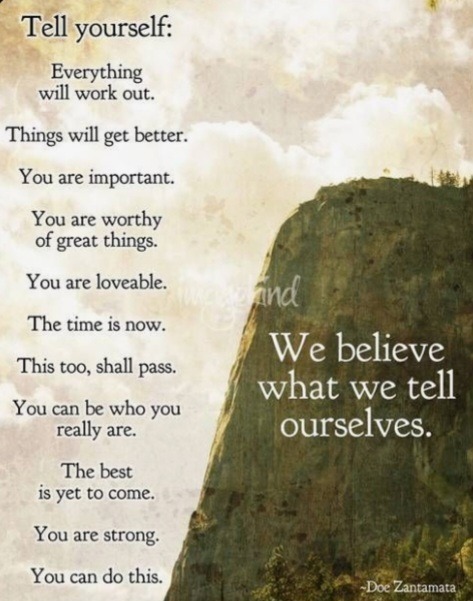#tell yourself
Text

𝐓𝐮𝐞𝐬𝐝𝐚𝐲🌿
53 notes
·
View notes
Text
25. Star Twinkle Precure ED 3 x Tell Yourself (Clazziquai)
2 notes
·
View notes
Text

#mental health memes#mental health#mental health matters#mental health awareness#reminder#tell yourself#remind yourself#say it out loud
13 notes
·
View notes
Text
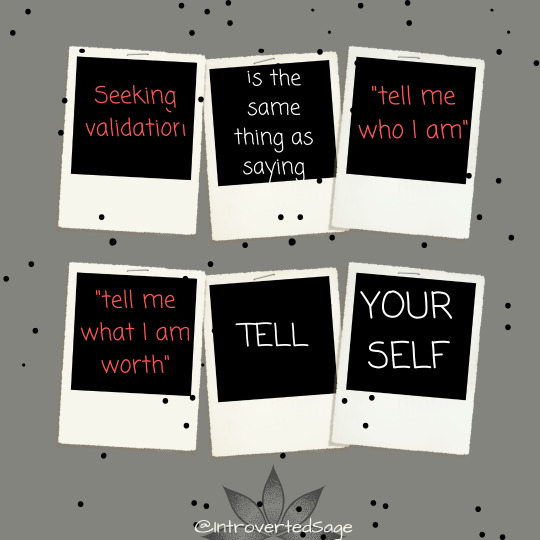
Seeking validation
is the same thing as saying
"tell me who I am"
"tell me what I am worth"
TELL
YOURSELF
#worth#validation#seeking validation#see#know your worth#value#who am I#tell yourself#self love#self care#love#growth#learning#healing#mindset#external validation#internal strenth#lha#1introvertedsage#intsa original#quotes
1 note
·
View note
Text
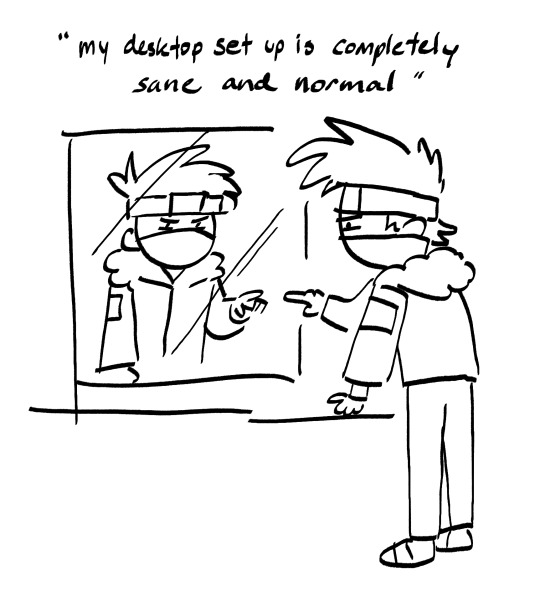

mhm… sure… “completely normal and sane”…. yep
#(keep telling that to yourself etho LOL)#(thank you hoffen for the affirmation quote lol)#ethoslab#hermitcraft#hc s10#hc10#mcyt#fanart#digital art#waveleoart
7K notes
·
View notes
Text
People who don't have autism: you can't self diagnose yourself with autism no matter how much research you do! You have to take 3947493 tests and pay thousands of dollars before you can call yourself autistic!!
People who have autism: yeah you're autistic. We're diagnosing you.
#I do this to people I know are autistic. Yeah stop doubting yourself I can tell. *Steven Yeun voice* you are. you are autistic.#Autism
16K notes
·
View notes
Text

#idk how common this superstition is#but my mom always tells me that you can’t talk when you’re sewing on yourself#otherwise you will sew on your soul#or memory#baldur's gate 3#bg3#bloodweave#gale dekarios#gale of waterdeep#astarion#baldurs gate 3
5K notes
·
View notes
Text
Google’s enshittification memos
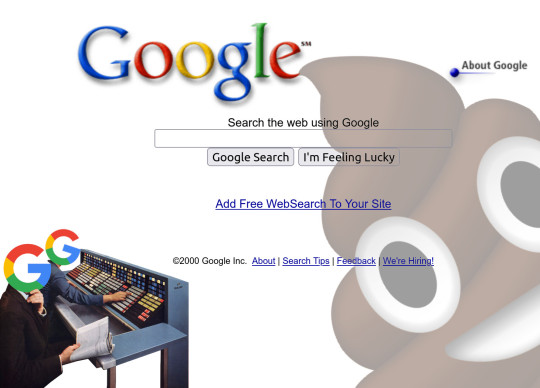
[Note, 9 October 2023: Google disputes the veracity of this claim, but has declined to provide the exhibits and testimony to support its claims. Read more about this here.]

When I think about how the old, good internet turned into the enshitternet, I imagine a series of small compromises, each seemingly reasonable at the time, each contributing to a cultural norm of making good things worse, and worse, and worse.
Think about Unity President Marc Whitten's nonpology for his company's disastrous rug-pull, in which they declared that everyone who had paid good money to use their tool to make a game would have to keep paying, every time someone downloaded that game:
The most fundamental thing that we’re trying to do is we’re building a sustainable business for Unity. And for us, that means that we do need to have a model that includes some sort of balancing change, including shared success.
https://www.wired.com/story/unity-walks-back-policies-lost-trust/
"Shared success" is code for, "If you use our tool to make money, we should make money too." This is bullshit. It's like saying, "We just want to find a way to share the success of the painters who use our brushes, so every time you sell a painting, we want to tax that sale." Or "Every time you sell a house, the company that made the hammer gets to wet its beak."
And note that they're not talking about shared risk here – no one at Unity is saying, "If you try to make a game with our tools and you lose a million bucks, we're on the hook for ten percent of your losses." This isn't partnership, it's extortion.
How did a company like Unity – which became a market leader by making a tool that understood the needs of game developers and filled them – turn into a protection racket? One bad decision at a time. One rationalization and then another. Slowly, and then all at once.
When I think about this enshittification curve, I often think of Google, a company that had its users' backs for years, which created a genuinely innovative search engine that worked so well it seemed like *magic, a company whose employees often had their pick of jobs, but chose the "don't be evil" gig because that mattered to them.
People make fun of that "don't be evil" motto, but if your key employees took the gig because they didn't want to be evil, and then you ask them to be evil, they might just quit. Hell, they might make a stink on the way out the door, too:
https://theintercept.com/2018/09/13/google-china-search-engine-employee-resigns/
Google is a company whose founders started out by publishing a scientific paper describing their search methodology, in which they said, "Oh, and by the way, ads will inevitably turn your search engine into a pile of shit, so we're gonna stay the fuck away from them":
http://infolab.stanford.edu/pub/papers/google.pdf
Those same founders retained a controlling interest in the company after it went IPO, explaining to investors that they were going to run the business without having their elbows jostled by shortsighted Wall Street assholes, so they could keep it from turning into a pile of shit:
https://abc.xyz/investor/founders-letters/ipo-letter/
And yet, it's turned into a pile of shit. Google search is so bad you might as well ask Jeeves. The company's big plan to fix it? Replace links to webpages with florid paragraphs of chatbot nonsense filled with a supremely confident lies:
https://pluralistic.net/2023/05/14/googles-ai-hype-circle/
How did the company get this bad? In part, this is the "curse of bigness." The company can't grow by attracting new users. When you have 90%+ of the market, there are no new customers to sign up. Hypothetically, they could grow by going into new lines of business, but Google is incapable of making a successful product in-house and also kills most of the products it buys from other, more innovative companies:
https://killedbygoogle.com/
Theoretically, the company could pursue new lines of business in-house, and indeed, the current leaders of companies like Amazon, Microsoft and Apple are all execs who figured out how to get the whole company to do something new, and were elevated to the CEO's office, making each one a billionaire and sealing their place in history.
It is for this very reason that any exec at a large firm who tries to make a business-wide improvement gets immediately and repeatedly knifed by all their colleagues, who correctly reason that if someone else becomes CEO, then they won't become CEO. Machiavelli was an optimist:
https://pluralistic.net/2023/07/28/microincentives-and-enshittification/
With no growth from new customers, and no growth from new businesses, "growth" has to come from squeezing workers (say, laying off 12,000 engineers after a stock buyback that would have paid their salaries for the next 27 years), or business customers (say, by colluding with Facebook to rig the ad market with the Jedi Blue conspiracy), or end-users.
Now, in theory, we might never know exactly what led to the enshittification of Google. In theory, all of compromises, debates and plots could be lost to history. But tech is not an oral culture, it's a written one, and techies write everything down and nothing is ever truly deleted.
Time and again, Big Tech tells on itself. Think of FTX's main conspirators all hanging out in a group chat called "Wirefraud." Amazon naming its program targeting weak, small publishers the "Gazelle Project" ("approach these small publishers the way a cheetah would pursue a sickly gazelle”). Amazon documenting the fact that users were unknowingly signing up for Prime and getting pissed; then figuring out how to reduce accidental signups, then deciding not to do it because it liked the money too much. Think of Zuck emailing his CFO in the middle of the night to defend his outsized offer to buy Instagram on the basis that users like Insta better and Facebook couldn't compete with them on quality.
It's like every Big Tech schemer has a folder on their desktop called "Mens Rea" filled with files like "Copy_of_Premeditated_Murder.docx":
https://doctorow.medium.com/big-tech-cant-stop-telling-on-itself-f7f0eb6d215a?sk=351f8a54ab8e02d7340620e5eec5024d
Right now, Google's on trial for its sins against antitrust law. It's a hard case to make. To secure a win, the prosecutors at the DoJ Antitrust Division are going to have to prove what was going on in Google execs' minds when the took the actions that led to the company's dominance. They're going to have to show that the company deliberately undertook to harm its users and customers.
Of course, it helps that Google put it all in writing.
Last week, there was a huge kerfuffile over the DoJ's practice of posting its exhibits from the trial to a website each night. This is a totally normal thing to do – a practice that dates back to the Microsoft antitrust trial. But Google pitched a tantrum over this and said that the docs the DoJ were posting would be turned into "clickbait." Which is another way of saying, "the public would find these documents very interesting, and they would be damning to us and our case":
https://www.bigtechontrial.com/p/secrecy-is-systemic
After initially deferring to Google, Judge Amit Mehta finally gave the Justice Department the greenlight to post the document. It's up. It's wild:
https://www.justice.gov/d9/2023-09/416692.pdf
The document is described as "notes for a course on communication" that Google VP for Finance Michael Roszak prepared. Roszak says he can't remember whether he ever gave the presentation, but insists that the remit for the course required him to tell students "things I didn't believe," and that's why the document is "full of hyperbole and exaggeration."
OK.
But here's what the document says: "search advertising is one of the world's greatest business models ever created…illicit businesses (cigarettes or drugs) could rival these economics…[W]e can mostly ignore the demand side…(users and queries) and only focus on the supply side of advertisers, ad formats and sales."
It goes on to say that this might be changing, and proposes a way to balance the interests of the search and ads teams, which are at odds, with search worrying that ads are pushing them to produce "unnatural search experiences to chase revenue."
"Unnatural search experiences to chase revenue" is a thinly veiled euphemism for the prophetic warnings in that 1998 Pagerank paper: "The goals of the advertising business model do not always correspond to providing quality search to users." Or, more plainly, "ads will turn our search engine into a pile of shit."
And, as Roszak writes, Google is "able to ignore one of the fundamental laws of economics…supply and demand." That is, the company has become so dominant and cemented its position so thoroughly as the default search engine across every platforms and system that even if it makes its search terrible to goose revenues, users won't leave. As Lily Tomlin put it on SNL: "We don't have to care, we're the phone company."
In the enshittification cycle, companies first lure in users with surpluses – like providing the best search results rather than the most profitable ones – with an eye to locking them in. In Google's case, that lock-in has multiple facets, but the big one is spending billions of dollars – enough to buy a whole Twitter, every single year – to be the default search everywhere.
Google doesn't buy its way to dominance because it has the very best search results and it wants to shield you from inferior competitors. The economically rational case for buying default position is that preventing competition is more profitable than succeeding by outperforming competitors. The best reason to buy the default everywhere is that it lets you lower quality without losing business. You can "ignore the demand side, and only focus on advertisers."
For a lot of people, the analysis stops here. "If you're not paying for the product, you're the product." Google locks in users and sells them to advertisers, who are their co-conspirators in a scheme to screw the rest of us.
But that's not right. For one thing, paying for a product doesn't mean you won't be the product. Apple charges a thousand bucks for an iPhone and then nonconsensually spies on every iOS user in order to target ads to them (and lies about it):
https://pluralistic.net/2022/11/14/luxury-surveillance/#liar-liar
John Deere charges six figures for its tractors, then runs a grift that blocks farmers from fixing their own machines, and then uses their control over repair to silence farmers who complain about it:
https://pluralistic.net/2022/05/31/dealers-choice/#be-a-shame-if-something-were-to-happen-to-it
Fair treatment from a corporation isn't a loyalty program that you earn by through sufficient spending. Companies that can sell you out, will sell you out, and then cry victim, insisting that they were only doing their fiduciary duty for their sacred shareholders. Companies are disciplined by fear of competition, regulation or – in the case of tech platforms – customers seizing the means of computation and installing ad-blockers, alternative clients, multiprotocol readers, etc:
https://doctorow.medium.com/an-audacious-plan-to-halt-the-internets-enshittification-and-throw-it-into-reverse-3cc01e7e4604?sk=85b3f5f7d051804521c3411711f0b554
Which is where the next stage of enshittification comes in: when the platform withdraws the surplus it had allocated to lure in – and then lock in – business customers (like advertisers) and reallocate it to the platform's shareholders.
For Google, there are several rackets that let it screw over advertisers as well as searchers (the advertisers are paying for the product, and they're also the product). Some of those rackets are well-known, like Jedi Blue, the market-rigging conspiracy that Google and Facebook colluded on:
https://en.wikipedia.org/wiki/Jedi_Blue
But thanks to the antitrust trial, we're learning about more of these. Megan Gray – ex-FTC, ex-DuckDuckGo – was in the courtroom last week when evidence was presented on Google execs' panic over a decline in "ad generating searches" and the sleazy gimmick they came up with to address it: manipulating the "semantic matching" on user queries:
https://www.wired.com/story/google-antitrust-lawsuit-search-results/
When you send a query to Google, it expands that query with terms that are similar – for example, if you search on "Weds" it might also search for "Wednesday." In the slides shown in the Google trial, we learned about another kind of semantic matching that Google performed, this one intended to turn your search results into "a twisted shopping mall you can’t escape."
Here's how that worked: when you ran a query like "children's clothing," Google secretly appended the brand name of a kids' clothing manufacturer to the query. This, in turn, triggered a ton of ads – because rival brands will have bought ads against their competitors' name (like Pepsi buying ads that are shown over queries for Coke).
Here we see surpluses being taken away from both end-users and business customers – that is, searchers and advertisers. For searchers, it doesn't matter how much you refine your query, you're still going to get crummy search results because there's an unkillable, hidden search term stuck to your query, like a piece of shit that Google keeps sticking to the sole of your shoe.
But for advertisers, this is also a scam. They're paying to be matched to users who search on a brand name, and you didn't search on that brand name. It's especially bad for the company whose name has been appended to your search, because Google has a protection racket where the company that matches your search has to pay extra in order to show up overtop of rivals who are worse matches. Both the matching company and those rivals have given Google a credit-card that Google gets to bill every time a user searches on the company's name, and Google is just running fraudulent charges through those cards.
And, of course, Google put this in writing. I mean, of course they did. As we learned from the documentary The Incredibles, supervillains can't stop themselves from monologuing, and in big, sprawling monopolists, these monologues have to transmitted electronically – and often indelibly – to far-flung co-cabalists.
As Gray points out, this is an incredibly blunt enshittification technique: "it hadn’t even occurred to me that Google just flat out deletes queries and replaces them with ones that monetize better." We don't know how long Google did this for or how frequently this bait-and-switch was deployed.
But if this is a blunt way of Google smashing its fist down on the scales that balance search quality against ad revenues, there's plenty of subtler ways the company could sneak a thumb on there. A Google exec at the trial rhapsodized about his company's "contract with the user" to deliver an "honest results policy," but given how bad Google search is these days, we're left to either believe he's lying or that Google sucks at search.
The paper trail offers a tantalizing look at how a company went from doing something that was so good it felt like a magic trick to being "able to ignore one of the fundamental laws of economics…supply and demand," able to "ignore the demand side…(users and queries) and only focus on the supply side of advertisers."
What's more, this is a system where everyone loses (except for Google): this isn't a grift run by Google and advertisers on users – it's a grift Google runs on everyone.

If you'd like an essay-formatted version of this post to read or share, here's a link to it on pluralistic.net, my surveillance-free, ad-free, tracker-free blog:
https://pluralistic.net/2023/10/03/not-feeling-lucky/#fundamental-laws-of-economics

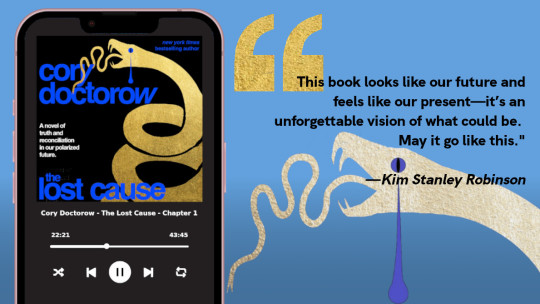
My next novel is The Lost Cause, a hopeful novel of the climate emergency. Amazon won't sell the audiobook, so I made my own and I'm pre-selling it on Kickstarter!
#pluralistic#enshittification#semantic matching#google#antitrust#trustbusting#transparency#fatfingers#serp#the algorithm#telling on yourself
6K notes
·
View notes
Text
Just saw someone ask for someone's irl age in their bio for "safety" or some shit and--
Friends, I'm telling you: this is the internet. There should be no expectation of access to your personal information.
Say nothing! Or if that doesn't work for you, fucking lie. Use a pseud! Say you live in a snail's shell off the coast of New Brunswick! Answer every info-gathering question asked of you with a different, less comprehensible answer! Tell anyone who says you've got to put your real age in your bio that you're 85, ta ever so, and they're very rude to bother you with this!
But your first step to internet safety is to say nothing.
Make it harder for bad actors to find you, manipulate you, or steal all your shit.
The good actors won't fucking ask.
#internet safety#please don't tell me SHIT about yourself in your bio unless you are CHOOSING a PUBLIC LIFE#and if you're choosing a public life CHRIST I HOPE YOU'RE KEEPING SAFE THERE TOO
4K notes
·
View notes
Text
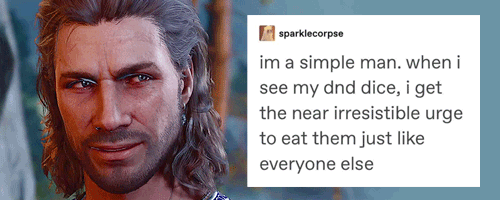
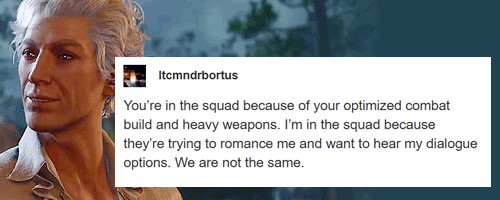
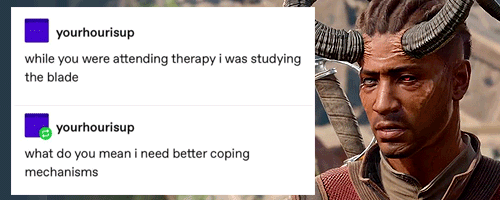
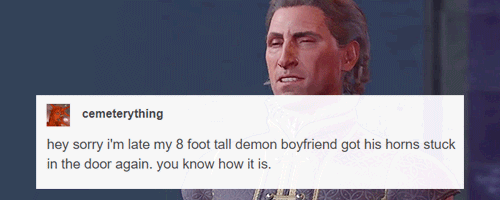
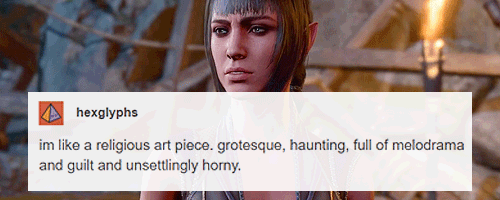
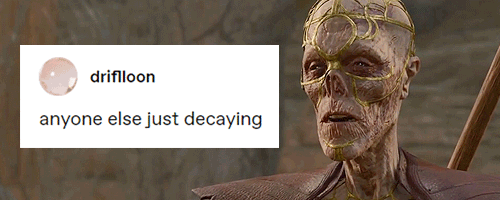
BG3 text posts - various (3/?)
#bg3#bg3edit#bg3 spoilers#baldurs gate 3#gale of waterdeep#astarion#wyll ravengard#bg3 raphael#raphael the cambion#shadowheart#bg3 withers#withers#bg3 text#baldurs gate 3 edit#tag yourself i'm gale and raphael#you can probably tell i'm having too much fun with these lol#1k
4K notes
·
View notes
Text
not to be an old cranky leftist but going forward i think those of us who live in the us need to remember a protest is not a group powerwalk to register polite disapproval with those in power
a protest is an implied threat. a protest says there are a lot of us, and we do not like what you’re doing. we are giving you a chance to course correct before we take things to the next level.
if there’s no shared commitment to the potential of moving to that next level: a protest is useless and essentially just public performance art.
#it’s suss out real priorities o’clock#if you wouldn’t risk yourself for the cause i’m not gonna tell you what to do#i will say a principle you won’t stick your neck out for isn’t actually a principle
53K notes
·
View notes
Text

#Columbo#peter falk#jerma#<- ..? tell me if you want me to remove that tag. it's Tangentially related.#sparkle on!#it's wednesday!#don't forget to be yourself!#this tickles me so much you don't even know#i was grinning like an idiot as i made it#it's perfect. i love him#i like to imagine he practiced it and is giggling as he says it#columbo wednesday
5K notes
·
View notes
Text
A Persuasive Argument - dpxdc
"Great!" Danny says, clapping his hands together to get everyone's attention. The dinner table falls silent as everyone looks towards him. It's a full house today and, honestly, Danny's a little nervous. "I'm sure you're all wondering why I gathered you here today."
"It's dinnertime. In our house." Duke mutters, while doing a very bad job of concealing his yawn. He holds his fork poised over the braised beef, but, just like everyone else, still looks towards Danny before tucking in. It's intriguing enough to wait.
"Yeah, no one misses Alfie's dinner." Dick says, with a brilliant smile that Danny can't help but return.
"Precisely! What better time to talk to you all than when you're all actually here!"
"Wait, I thought you came round to work on our English essays?" Tim asks, blinking owlishly.
"I'm afraid I've lured you here under false pretences, Tim."
"This is where I live."
"I would still really appreciate help on that essay though, I mean, what the hell is Hamlet even about? I just don't get that old time-y language, like 'Hark! A ghost hath killed me!' - absolute rubbish, what does that even mean?"
"The ghost never kills anyone in Hamlet, he's there to tell Hamlet that he was murdered. Have you actually read it?"
"No, but it sounds like you have. Tim, I want this guy to help me with my essay instead. I know for a fact that you haven't read Hamlet, either."
"So? We don't need Jason, I've read the Sparknotes."
"Hi Jason, I'm Danny, pleasure to meet you, summarise Hamlet in three sentences or less."
"Am I auditioning to help you write your essays? I can't believe you’ve gone through your whole school life without reading it, it’s good!"
"Hamlet, along with a number of other classics, was banned in our house because it portrayed ghosts as intelligent and sympathetic beings rather than evil, animalistic beasts. I didn’t even get to see The Muppet's Christmas Carol until last year with Tim! It was surprisingly good, and I hate Christmas because everyone always argued and it sucked. But we're getting off topic. I—"
"No, no, please go back to that, because what the fu—"
"Boys, please." Bruce interrupts, looking to the world as if he wants to hang his head in his hands. "Danny, you were about to say something?"
"Oh, yeah, Mr. Wayne! Thanks!"
"Please, call me Bruce."
"Well, that very succinctly brings me to my point, because I'd actually really like to call you dad."
Nobody says a word. Nobody even blinks, all as shocked as the other, watching open-mouthed as Danny pulls his laptop out from beside his chair. Bruce can definitely feel a headache coming on.
"Before you say anything, I've prepared a 69 slide PowerPoint presentation on why you, Bruce Wayne, should adopt me, Danny Last-Name-Pending. Please save your questions, comments, and verdict until the end, thank you."
#dpxdc#batpham#i forget - can we tag the parent fandoms? w/e#immediately alfred's like: while i do appreciate your initiative may i suggest it wait until after dinner?#and danny - who has barely eaten proper homecooked food ever - takes one bite and then absolutely wolfs down the whole lot#after he's finished he's like 'bear with - I've got to add that to the 'Reasons I Would Like to Live Here' section'#danny's powerpoint has tailored sections for each batfam member with lists of reasons why they'd get along#my au thoughts on this is that the fentons disowned danny when he told them he was phantom#and that this is after the ultimate enemy - wherein which he allied himself with the JL to fight against dan#(which didnt really work at all - BUT he knows some of their identities now INCLUDING batman's)#so one of the main reasons why he'd be a great fit is that he knows their vigilante status anyway so they don’t need to worry about secrets#dick just turns to tim like 'he’s your friend. he learnt this from you.'#tim: 'i didn't tell him our identities!! i would never!!'#dick: 'no i know that. it's the stalker tendancies. it's baby tim all over again'#tim: scandalised gasp#they all eat dinner in silence just super subdued and in shock and sending glances to bruce and danny#duke like: 'so i know I'm the last one in the family but like... this isn't how it normally happens right? did any of you make powerpoints?#tim gets all shifty because he absolutely did make a powerpoint he just never actually showed it to anyone#everyone stares at tim because they all know. it was in one of bab's blackmail files she has on him#damian's slide has danny offering to throw down at any time. 'tim says you like to prove yourself with your skills?#how about a real challenge? if i beat you then you have to vote yes to adopting me!'#damian is in two minds about accepting because... 1) look at him damian could take danny in his sleep! but#2) on the off chance that he does win... damian does not want any more brothers#(he takes the bet and its a suprisingly fun fight - and while he'll never say this... he would vote yes even without the wager)#on one of danny's slides there's a picture of ellie: you'll also get my clone sister! two children for the price of one!!#uhhh.... thats it now - I've been having fun with this haha#spent all day with the 'ive lured you here under false pretences' 'danny i live here' line in my head haha#anyway enjoy!!!!!! this was fun#i wanna make these slides so bad
3K notes
·
View notes
Text
I really find it interesting how Zionists have no issues constantly using words like "Islamic" or "Islamist" or "jihadist" to describe the people they're killing without any fear of being accused of Islamophobia or that they're being bigots.
Because they know that we live in a world where anything or anyone remotely "Muslim" are automatically portrayed as inherently evil and deserving of death, especially in the US and other Western countries where Israel gets most of its support from them. So therefore, no one can be mad at them for killing all of these people, right? After all, they're only killing scary radical "Islamists" and "jihadists," NOT innocent people.
Meanwhile you would never hear any pro-Palestine people calling IDF soldiers "Jewists" or "Jewish extremists," even when they're literally branding the star of David onto Palestinians' faces and houses, instead we have to be very careful to not associate Judaism with Israel's crimes and are obligated to write a long essay about how we in fact do NOT want to kill every Jew in the world before we're allowed to show a shred of sympathy toward the thousands of Palestinian civilians being murdered as we are speaking.
Yet somehow that's not enough and they still hit us with the "when you say Zionists you actually mean Jews!" all while ignoring how they themselves aren't putting any effort into not demonizing Islam and Muslims with their words, because demonizing Islam and Muslims isn't an issue to them and the only way they can justify all the killing they're doing.
#as a Muslim I still find it funny how non-Muslim still think that Jihad is a bad or a scary word#White Supremacists decided to hijack the meaning of this world and make it into a code-name for mass killing#and jihadist is just another word for terrorist#but that's not actual the meaning of the word in the literal Arabic language and Islam as religion#not in the past not in the present and not anytime in the future#unless of course you're a White Supremacist yourself#then continue telling yourself that's what these words from a language you don't speak mean#hence why Zionists (the biggest White Supremacists) continue using that words as if its something negative#so that other White Supremacists will stand with them against these evil Jihadists#palestine#gaza#palestinian#anti israel#anti israeli#anti zionist#anti zionism
4K notes
·
View notes
Text
I genuinely think that any change in behavior starts w telling yourself that your worst days, worst performances, just worst moments in general aren’t who you “truly are.” It’s all about unlearning any thought process that essentially chalks up traits you aren’t proud of to “this is who I really am” “in reality I’m lazy” “in reality I’m just a bad person” bc not only is that never true, but it impedes your efforts to try to do better as well. Anything we struggle with has roots in things like childhood trauma, thoughts you’ve been fed before, your upbringing…. but never that you’re inherently a bad person. What I’m learning this year is that a lot of us doing better & being better & improving really comes down to self-talk—to disavowing the very notion that deep down we’re simply bad.
#Bc how do you work on “this is who I am”#It’s like a self fulfilling prophecy#If you keep telling yourself this is just who you are then every time you improve you’ll feel cognitive dissonance and self-sabotage#It’s important to operate not from “this is who I am” but from “this is what I’ve been nurtured to be but I can change that”
3K notes
·
View notes
